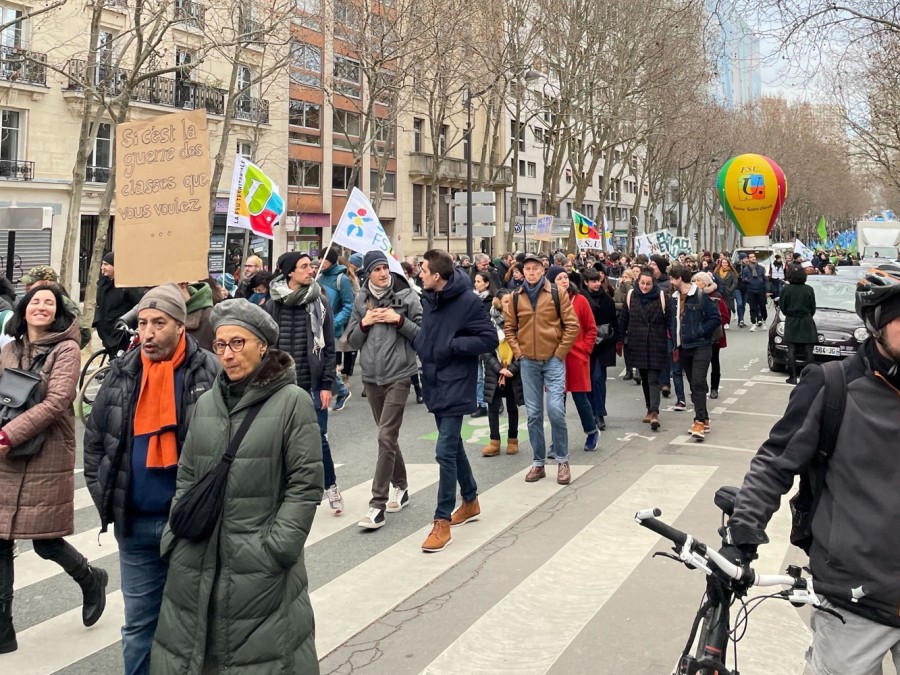NYU Paris students struggle to navigate citywide strikes
As protests escalate, students at NYU Paris face increasingly difficult commutes.
(Sydney Barragan for WSN)
March 31, 2023
In Paris’ Latin Quarter, students are making their way to class on sidewalks lined by piles of trash left untouched by sanitation workers. It comes as no surprise to students at NYU Paris — multiple emails from university administrators over the past two months warned of ongoing unrest in the French capital.
Anger has been intensifying in Paris since President Emmanuel Macron’s divisive reform to the nation’s pension system, which raised the national retirement age from 62 to 64. On March 16, Macron utilized Article 49.3 of the constitution to push his bill through without a vote of approval in the National Assembly.
A week later, crowds stormed Paris’ Place de la Concorde, the site of Louis XVI’s execution, with some even chanting, “Louis XVI, they beheaded you. Macron, we can do it again.” Across the country, frenzied protests have also continued, closing airports, disrupting public transportation, interrupting essential services and even setting the Bordeaux City Hall ablaze.
“The strikes have been a major inconvenience for me,” Gallatin student William Apostolica said. “They interrupted the metro services and have caused a great deal of trash along the streets of Paris. The sounds of the sirens from the police cars have been quite exhausting to listen to on loop.”
Since strikes began in January, NYU Paris students have been warned of interruptions to the transit system with frequent emails from the Office of Student Life & Services, and had been advised to set aside ample time when commuting if their classes had not already been moved to Zoom. Despite the warning, delayed and infrequent trains have continued to cause issues for students on their way to campus.
Students living the farthest away from campus —in Résidence Étudiante Paris Bagnolet, Les Estudines, located just outside Paris’ city limits — were most impacted by the disruptions. Living well past walking distance from campus, these students rely on a running transit system to get to class even more than their classmates.
Gallatin student and Les Estudines resident Zamiya Jean had two classes on one day during a strike, and was unaware that the train she would need to take home that evening had stopped running earlier in the afternoon.
“I took the 4 and tried to transfer, but I ended up getting stuck because the train was closed,” Jean said. “From there, I had to figure out how to bike all the way home. I made it safely even though my phone died on the way.”
Emails also warned students of large-scale marches across the city, instructing them to avoid all rallies and demonstrations when possible. But, as protests escalated, it became increasingly difficult for students to steer clear.
Earlier this month, Stern junior Elizabeth Velazquez saw a large group marching along Rue Bobillot from her window.
“The demonstration gathered around 4 p.m. and turned violent around 9 p.m.,” Velazquez said. “The French police, dressed in full gear, ran after the protesters and threw tear gas at the crowd.”
Since then, protests have escalated, with nearly 740,000 people participating in more than 200 strikes across France this Tuesday, 93,000 of which were concentrated in Paris alone. According to Gérald Darmanin, the country’s interior minister, 13,000 police officers were deployed across the country in response.
The response to the proposed reform is indicative of a broader dissatisfaction with working conditions, according to Imola Streho, a former Emile Noël Fellow at NYU’s School of Law and, and a current professor at NYU Paris.
“Everybody understands that things have to change,” Streho said. “The contestation is not about doing something, it’s more about why this is the only variable being adjusted.”
France has an aging population due to an increase in life expectancy and a decrease in the birth rate. There are now fewer younger, working-age people who are able to support a growing number of pensioners. An increase in the minimum age of retirement serves as an attempt to balance the uneven system.
The protests’ future are still uncertain. Garbage collectors resumed work as of March 29, but major trade unions are preparing for another strike on April 6. As for NYU Paris students, classes will continue, despite the distractions.
“From the point of view of the working class in France, I fully support them and what they’re doing,” Tisch junior Amy Petralia said. “But as a student abroad in this country, it’s difficult.”
Contact Sydney Barragan at [email protected].

























































































































































